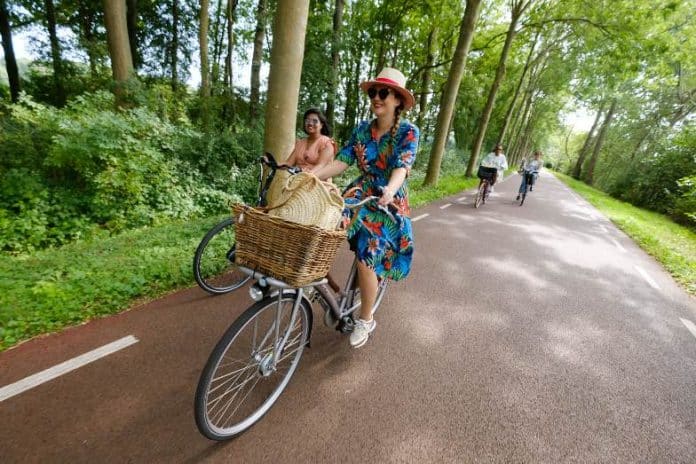Could you adapt your mode of transport to travel sustainably for a week? That’s the challenge citizens across Europe will be taking on for this year’s European Mobility Week.
From 16-22 September, hundreds of European cities and towns are taking part in the European Commission’s awareness-raising campaign which seeks to encourage behavioural change in favour of active mobility such as walking and cycling, public transport, and other clean, intelligent transport solutions. Here we look at examples of initiatives taking place in the Benelux region.
In 2022, European Mobility week is focused on creating ‘Better Connections’.
Connected through public transport
“The choice of this year’s theme reflects people’s desire to reconnect with each other across Europe, after months of isolation, restrictions and constraints. Thanks to public transport, people have the means to stay connected,” explains Kim Vo, Head of Communications and Public Relations at the Ministry of Mobility and Public Works in the Grand Duchy of Luxembourg, where public transport has been free since 2020.
Cities and municipalities across Luxembourg are taking part in the week, including the city of Esch-sur-Alzette which will be going car-free on September 18. In Schuttrange, citizens travelling by modes such as bike or public transport will be treated to Fairtrade pastries on September 16. In Ell, school pupils are invited to ‘Pimp your bus shelter’ by decorating it with washable colours.
Luxembourg City Tourist Office will be providing free tours by bike and foot to showcase the capital’s mobility infrastructure. The City of Luxembourg, NGO Info-Handicap and other partners are also launching the public awareness campaign ‘It’s everyone’s journey’, which seeks to improve the journeys of passengers with disabilities on public transport and related infrastructure through increased empathy, respect and consideration.
Sustainable mobility for a healthier future

In the Netherlands, the Province of Utrecht is organising activities including bike puzzle tours, a cycle ride with the Bicycle Mayor of Utrecht (an individual selected to be the face and voice of cycling progress in a city), reductions on bus tickets and bike-sharing services.
The city of Amersfoort will close off part of a busy road to motorised traffic from the evening of September 16 to the 18th. Music, sports and games will replace the thousands of cars that typically drive on the road each day.
“To keep our province accessible, green, and healthy, we are encouraging the use of sustainable mobility. Sustainable mobility is good for the environment and takes up less space in our busy cities and province. And if you choose to cycle or walk, it’s also good for your health,” says Marjolein Antonides, Campaign Coordinator and Communications Specialist at the Province of Utrecht.
Child-friendly mobility

In the Brussels-Capital Region in Belgium, the theme for this year’s mobility week is ‘For a child-friendly city’. Over the past 15 years, more and more young people make their way to schools in the Brussels region by bike and public transport. Fewer are travelling by car, with 62% of primary school pupils and 84% of secondary school pupils taking alternative modes of transport at least one in every two days. Brussels Mobility wants to see more young people able to move actively and safely around the city and seeks to increase these figures to 70% and 90% respectively by 2030.
“Rethinking public space by taking into account the needs of children means rethinking mobility for a more inclusive city for the benefit of all,” explains Camille Thiry, Head of Communication for Brussels Mobility.
Pupils are invited to join the challenge ‘To school without my car’ and to go to school by foot or bike. Adults are encouraged to take part in the ‘To work without my car’ challenge. Employees at some 200 companies will be able to test more sustainable transport modes, with Brussels Mobility providing public transport tickets, as well as (electric) bicycles, electric scooters and cargo bikes for them to try for the week.
On September 18, the Brussels-Capital region will also become the largest area closed to cars in Europe as part of ‘Car-Free Sunday’. The local public transport system will be free throughout the day.
Safer streets as a human right
Safer roads are an essential part of the shift to greener mobility, and the UN campaign ‘Streets for life’ seeks a world where neighbourhood streets are safe, healthy, green and liveable. As part of the New Decade of Action for Road Safety, the global campaign has the goal of reducing the number of victims on roads in half by 2030.
“Road safety is a fundamental human right. It is essential for economic development, access to healthcare and education, and mitigation of climate change,” says United Nations Special Envoy for Road Safety Jean Todt.
Low speed streets, particularly in urban areas, are key so people can walk, live and play freely. If a collision occurs, the consequences are less serious at a lower speed. Since January 2021, cars in Brussels must respect a maximum speed limit of 30 km/h in most of the city’s streets. The ‘30 City scheme’ also seeks to improve health and reduce noise pollution. Other European cities to have introduced city-wide 30 km/h limits include Grenoble and Lille in France, and Bilbao and Valencia in Spain.
Luxembourg has introduced measures that include traffic calming, the development of 20 km/h and 30 km/h zones and new infrastructure for cyclists.
The Province of Utrecht is focusing on 3 E’s to improve road safety: Engineering, Education and Enforcement. This involves identifying locations that have an increased risk of accidents; raising awareness; and strengthening compliance with traffic rules.
“Safe mobility is a shared responsibility and today we need commitment from all leaders and members of the public to create safer streets for all,” concludes Mr Todt.
Find out more:




